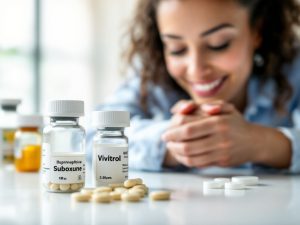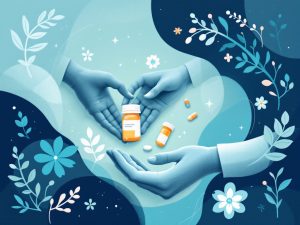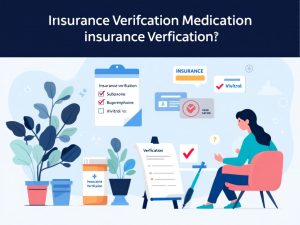When you are seeking a path forward from addictive behaviors or mental health challenges, a structured recovery program can be a powerful way to regain control and foster long-term wellness. Structure and routine give you the stability you need to replace harmful habits with healthier ones, building self-discipline while restoring hope. At Epic Health Partners, our outpatient services are designed to guide you in creating the foundation for lasting recovery. Whether you or a loved one are dealing with substance use issues, seeking psychiatric support, or hoping to address the underlying causes of addiction, our compassionate approach and evidence-based treatments can help you move closer to the life you deserve.
Understand the importance of structure
A structured daily routine helps you maintain stability when you are most vulnerable. Many individuals who embark on a recovery journey face difficulties returning to everyday life after experiencing substance use or mental health challenges. Without clarity and routine, returning to a dysfunctional lifestyle might seem easier than forging a healthier path. Studies show that structure and routine are essential because they offer a sense of security, promote discipline, and reduce the likelihood of falling back into self-destructive patterns (Gateway Foundation).
- Consistency builds confidence: When you wake up at the same time, eat balanced meals, and schedule daily check-ins with your support network, you reinforce your commitment to healing.
- Habit formation takes time: Research suggests that, on average, habits become automatic after about 66 days. By committing to a consistent schedule, you create space for new, positive behaviors to take root.
The role of self-control
Maintaining structure also boosts your self-control. When you set and follow a plan, you learn to meet internal expectations rather than relying on fleeting motivation. Adding elements like journaling, mindful breathing, or regular group therapy sessions helps you become more attuned to your cravings, triggers, and emotional fluctuations. This blend of discipline and self-awareness is vital for your continued progress in a structured recovery program.
How Epic Health Partners supports your routine
Epic Health Partners can help you or a loved one establish healthy habits and routines. Our outpatient behavioral health and psychiatric care services give you practical tools to manage daily highs and lows, with trained counselors offering guidance on everything from scheduling treatment sessions to adopting healthier sleep habits. The goal is to keep you active, accountable, and focused on your recovery milestones.
Recognize the stages of recovery
Understanding the arc of recovery can help you plan effectively for your next steps. Research indicates that recovery occurs in stages, each with its own set of vulnerabilities and potentials for growth (PMC). By knowing what to expect, you can better prepare yourself and stay focused on incremental progress.
Abstinence and early repair
The early phase of recovery often centers on abstinence, where you work hard to resist immediate temptations and establish distance from substances or behaviors that used to dominate your life. During this time, you might experience physical and emotional withdrawal or intense cravings. Peer support and professional counseling can help you manage these challenges. For some individuals, specialized care such as our heroin addiction treatment or fentanyl addiction treatment may be essential to navigate the initial hurdles toward sobriety.
Deeper emotional work
Once immediate withdrawal symptoms lessen, you begin to repair areas of your life affected by substance use. You might reevaluate finances, relationships, or career goals. This stage can be emotionally taxing—confronting guilt, shame, or strained family bonds often triggers uncomfortable memories. Nonetheless, working through these areas promotes genuine healing. A structured recovery program offers a clear roadmap, with supportive therapists helping you process and move forward rather than dwelling on the past.
Growth and ongoing progress
Over time, you develop healthier coping strategies and stronger self-awareness. It’s common to discover that life in recovery involves continual learning. Even if you reach a stable place, you should remain vigilant against triggers. Engaging in long-term outpatient programs or group therapies can help you protect the progress you have made. By embracing the growth stage wholeheartedly, you reinforce a future that is not just free of substances, but also rich in purpose and meaning.
Build healthy routines
Adopting and maintaining healthy routines is one of the most effective ways to replace harmful behaviors and reduce the chance of relapse. These daily practices strengthen your resolve and regulate your emotional well-being, providing you with a valuable anchor during challenging moments.
The power of consistency
A balanced daily schedule often includes:
- Waking up at a consistent time to stabilize your sleep cycle.
- Planning regular mealtimes, which can help you maintain physical health and steady energy levels.
- Incorporating short exercise sessions, whether it is gentle stretching or a brisk walk.
- Scheduling therapy appointments and support group meetings to stay accountable.
Studies have shown that when individuals consistently follow structured routines, they experience improved self-esteem and better mental health (Gateway Foundation). You can also make space for mindfulness practices, journaling, or relaxation techniques to maintain a calm and focused mindset.
Addressing co-occurring health conditions
Those in recovery might face co-occurring conditions such as hypertension or diabetes. Regular routines that include proper diet, medication reminders, and consistent exercise can help you manage these conditions. Reliability in your daily tasks promotes a sense of control, which is especially important if you previously felt that you had little influence over your own life.
How Epic Health Partners can guide you
At Epic Health Partners, our mission is to help you design a balanced approach to each day. If you need help with specific interventions, we offer programs like cbt for addiction or mindfulness therapy addiction. These therapies emphasize consistent, daily practices to stabilize your emotions and behaviors. By tackling any underlying issues alongside the surface symptoms, you can develop a more holistic sense of wellness.
Focus on holistic well-being
A structured recovery program covers more than just staying sober. True recovery includes cultivating emotional health, building supportive social connections, and finding opportunities for personal growth. A holistic focus addresses every aspect of your life to ensure that improvements in one area extend to others.
Mind-body relaxation
Techniques such as yoga, meditation, and mindfulness-based relapse prevention can help reduce stresses that often trigger substance use. According to evidence compiled in clinical research, mind-body relaxation can significantly curb drug and alcohol use and nurture healthier coping mechanisms (PMC). Practicing these skills regularly helps you confront cravings, intrusive worries, or negative thinking patterns.
Physical health considerations
Substance use disorders often take a toll on physical well-being. A healthy diet, regular exercise, and good sleep hygiene can be essential in restoring your energy. By focusing on your nutritional status, for instance, you improve your mood and cognitive clarity. At Epic Health Partners, you can learn ways to integrate small but powerful daily activities into your life, including meal planning, short workout sessions, or relaxing nighttime routines designed to improve overall health.
Emotional support
Feelings of isolation or hopelessness can undermine your progress. Remember that reaching out to others for support is not a weakness, but a vital part of long-term recovery. Our outpatient team encourages you to seek mental health counseling, develop stable relationships, and address any underlying disorders. By tending to your emotional well-being, you reinforce your progress and reduce the likelihood of relapse.
Find support and community
An essential element of a structured recovery program is connecting with others who share similar experiences or can compassionately guide you. Gaining peer support can make a dramatic difference in avoiding isolation, maintaining motivation, and cultivating resilience.
The value of peer connection
Many social model rehabilitation settings focus on peer interaction as a cornerstone of healing. Rather than relying solely on formal therapy sessions, you learn from peers who have walked a similar path. These individuals can provide real-life examples of both struggle and triumph. Moreover, research highlights that peer support fosters genuine connection and cuts down on substance use (The Hope Institute).
Support groups and group therapy
When you engage in group therapy, you create bonds with others who understand the ups and downs of recovery. Sharing your story, hearing from others, and receiving immediate feedback can encourage you to acknowledge your progress more readily. Group sessions can also provide practical tips on topics like stress management, coping strategies, and healthy socializing. At Epic Health Partners, our group therapy addiction sessions invite you to explore your unique challenges in a compassionate group setting.
Community involvement
Structured recovery programs often promote active community participation to help you rebuild your sense of belonging. This can include volunteering, attending events, or undertaking local initiatives that enrich your experience and place you in a positive environment. You not only regain a sense of purpose but also contribute to the well-being of others, which can deepen your motivation to remain on track.
Explore treatment modalities
Effective recovery usually requires several types of therapy or intervention to address the complexities of substance use along with co-occurring mental health conditions. From psychoeducational groups to behavioral therapies, there are multiple proven models that might benefit you.
Psychoeducational groups
Psychoeducational groups aim to expand your awareness about the consequences of substance misuse, encourage self-awareness, and show you the growth options available along your journey (NCBI Bookshelf). Discussing realistic scenarios, reflecting on personal stories, and learning from professional insights give you the tools to recognize triggers. You can learn to reframe harmful beliefs that might have contributed to your situation in the past.
Skills development
Skills development groups sharpen your abilities to cope with triggers and stress in healthier ways. Whether you are working on strategies to refuse substances or learning to manage anger and frustration, these sessions revolve around acquiring practical tools for everyday challenges. You may also cultivate broader life skills—time management, emotional regulation, financial planning—that help you function better across multiple aspects of your life.
Cognitive-behavioral therapy
Cognitive-behavioral therapy (CBT) has proven extremely effective for many in early recovery (NCBI Bookshelf). This approach targets cognitive restructuring, empowering you to recognize and change negative thought patterns. By uncovering triggers, practicing desensitization, and establishing structured coping strategies, you can reduce impulsive behaviors and unhealthy responses. At Epic Health Partners, our cbt for addiction option is often integrated with other therapies for a more holistic focus on healing.
Additional services
Depending on your needs, you might benefit from:
- family therapy addiction to mend relationships
- dbt for addiction or dialectical behavior therapy for emotion regulation
- recovery coaching for ongoing accountability
- trauma informed addiction therapy to address underlying traumas
- holistic recovery therapy that supports body, mind, and spirit
These options ensure that you can customize your structured recovery program to match your unique circumstances.
Assess how Epic Health Partners can help
When you or a loved one decide to seek professional support, it is crucial to choose a provider with a deep understanding of trauma, mental health, and substance use treatment. Epic Health Partners is dedicated to offering comprehensive outpatient services for individuals who need flexible yet impactful care.
Specialized substance use care
Our holistic approach recognizes that each substance involves different triggers, risks, and withdrawal patterns. For instance, individuals grappling with prescription drug misuses, such as opioid medications, may require our prescription opioid treatment. Others might struggle with other substances like alcohol or methamphetamine, finding relief in our alcohol use disorder treatment or methamphetamine addiction treatment. We design programs that address the nuances of each addiction, always prioritizing your personal history, co-occurring disorders, and specific life circumstances.
Evidence-based therapies
At Epic Health Partners, our outpatient behavioral health and psychiatric services use evidence-based treatments, including CBT, DBT, and motivational interviewing. The goal is to give you validated methods for confronting negative thought patterns, regulating emotions, and preventing relapse. These therapies are tailored to your background, so you can see real progress without feeling pressured to follow a one-size-fits-all plan.
Flexible outpatient structure
We know life does not pause while you seek recovery. The flexibility of our outpatient model means you can schedule therapy sessions around work, family responsibilities, and personal commitments. This prevents disruptions to everyday life while ensuring you still benefit from professional guidance. Our approach emphasizes consistent check-ins and accountability—core components of a structured recovery program—without losing your independence.
Additional supportive services
Epic Health Partners offers a range of supportive services that combine to provide a well-rounded experience:
- sud case management for navigating insurance, employment concerns, and legal matters
- telehealth addiction counseling for those needing remote support
- nutrition support addiction to help restore physical health
- life skills training addiction for day-to-day management skills
By blending therapy, education, and peer collaboration, we can guide you through your entire journey toward lasting recovery.
Celebrate milestones and progress
A structured recovery program places importance on celebrating the steps you have accomplished. Milestones, whether they are 30 days of sobriety, completion of your first outpatient program, or a steady reintroduction to work or school, demonstrate how far you have come. They also encourage you to keep going, even when facing obstacles.
Why milestones matter
Research suggests that recognizing small victories promotes a positive mindset and a sense of self-efficacy. By pausing to honor your progress, you reinforce the behaviors that led to success (New Horizons Treatment Centers). This sense of achievement can serve as powerful motivation to continue following your structured recovery plan, reminding you of the resilience that you have already shown.
Sustaining a healthy vision
Recovery is rarely a straight, predictable path. Occasional setbacks or relapses can happen, but with the right structure in place, you have a roadmap to navigate those moments constructively. Each time you reach a new milestone, you bolster your vision of a healthier future. Epic Health Partners supports you in marking these achievements and planning your next goals, ensuring you remain empowered and focused.
Continuous growth
Long-term growth requires a proactive attitude. Even when you have achieved a period of sustained stability, it is helpful to keep monitoring your mental health, stress levels, and personal boundaries. By keeping momentum, you create an environment where health, home, purpose, and community align (NCBI Bookshelf). This integrated approach allows you to maintain achievements, nurture new relationships, and continue exploring ways to live a full, rewarding life.
Frequently asked questions
What is a structured recovery program?
A structured recovery program is a carefully organized plan that provides routine and consistency as you overcome addiction or mental health challenges. It usually involves scheduled therapy sessions, support groups, and daily habit formation, allowing you to replace harmful behaviors with healthier ones over time.How long does it typically last?
The length differs from person to person and depends on factors such as your substance of choice, any co-occurring disorders, and personal circumstances. Many programs recommend a minimum of 3 months, while others may extend beyond a year. The key is tailoring the timeline to your unique needs, tracking progress at every stage, and adjusting if necessary.How do I handle cravings and triggers?
Techniques like mindfulness, deep breathing, distraction methods, and reaching out to support networks are common ways to cope with cravings. Epic Health Partners also recommends therapies such as mindfulness therapy addiction and dbt for addiction, which can train you to better manage impulses and transform negative thought patterns.What if I relapse during the program?
Relapses can happen. They do not imply failure but signal that you may need additional support or a new strategy. You may revisit certain program elements, such as group therapy or specialized treatment like benzodiazepine addiction treatment or opioid addiction treatment. What matters is openly communicating with your treatment team and refining your approach to strengthen ongoing progress.Why choose Epic Health Partners for outpatient care?
Epic Health Partners offers a dynamic outpatient model tailored to individuals needing flexible yet impactful care. With evidence-based therapies, specialized programs for different addictions, and unwavering support from caring professionals, our goal is to empower you toward sustainable health and wellness. We strive to create a compassionate environment, ensuring that you always feel heard, respected, and guided in a positive direction.
Recovery rarely happens overnight. However, with consistency, structure, and an unwavering commitment to well-being, transformation is entirely possible. Epic Health Partners stands ready to help you or a loved one build momentum through a structured recovery program. By combining expert guidance, evidence-based treatments, and a determined focus on your unique goals, we walk alongside you, celebrating each step forward and ensuring you have the support necessary for lasting recovery. Engage with our team today to begin taking meaningful steps toward a healthier, fulfilling life.







